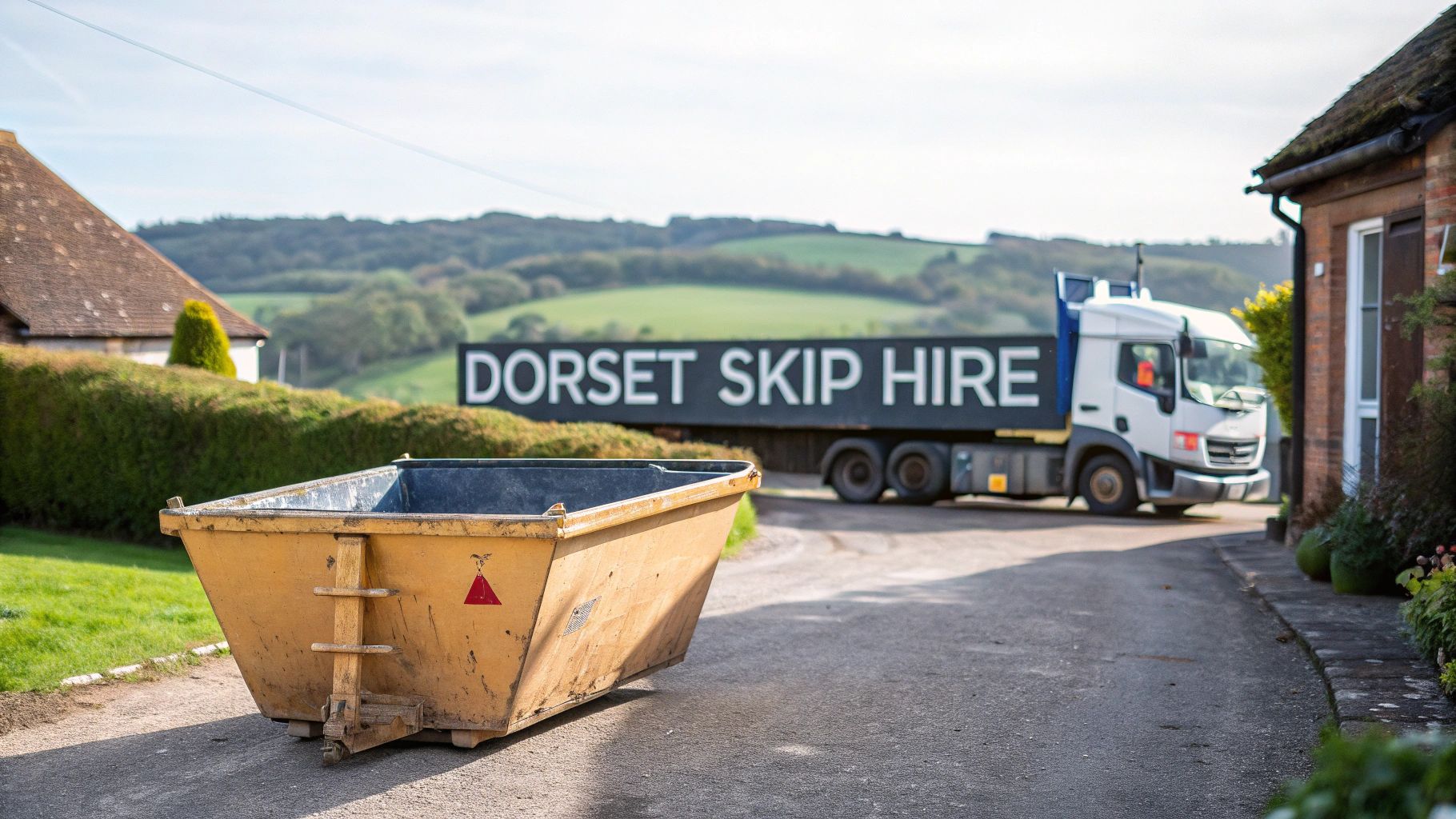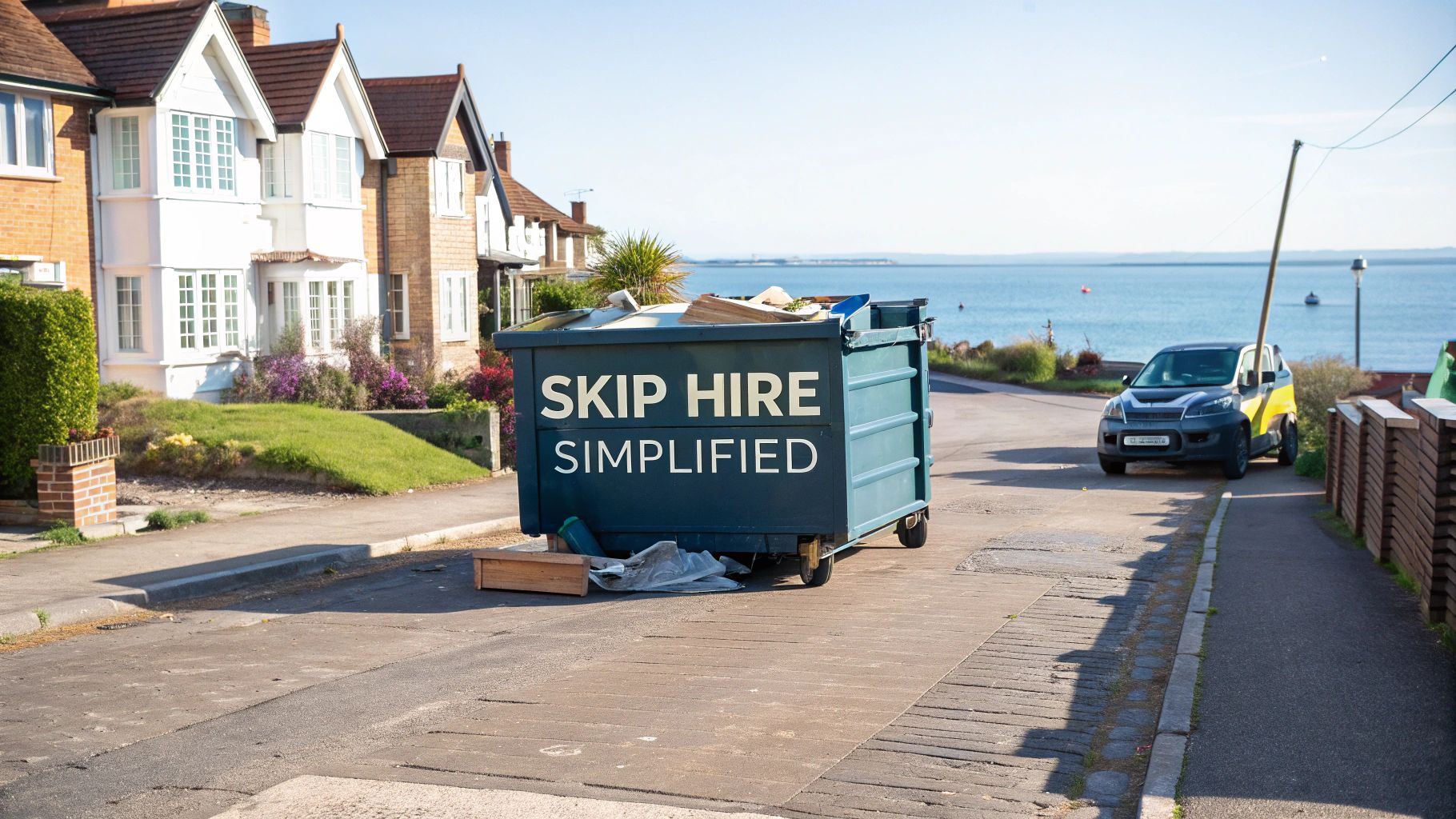What Can’t You Put in a Skip? 8 Banned Items for 2025
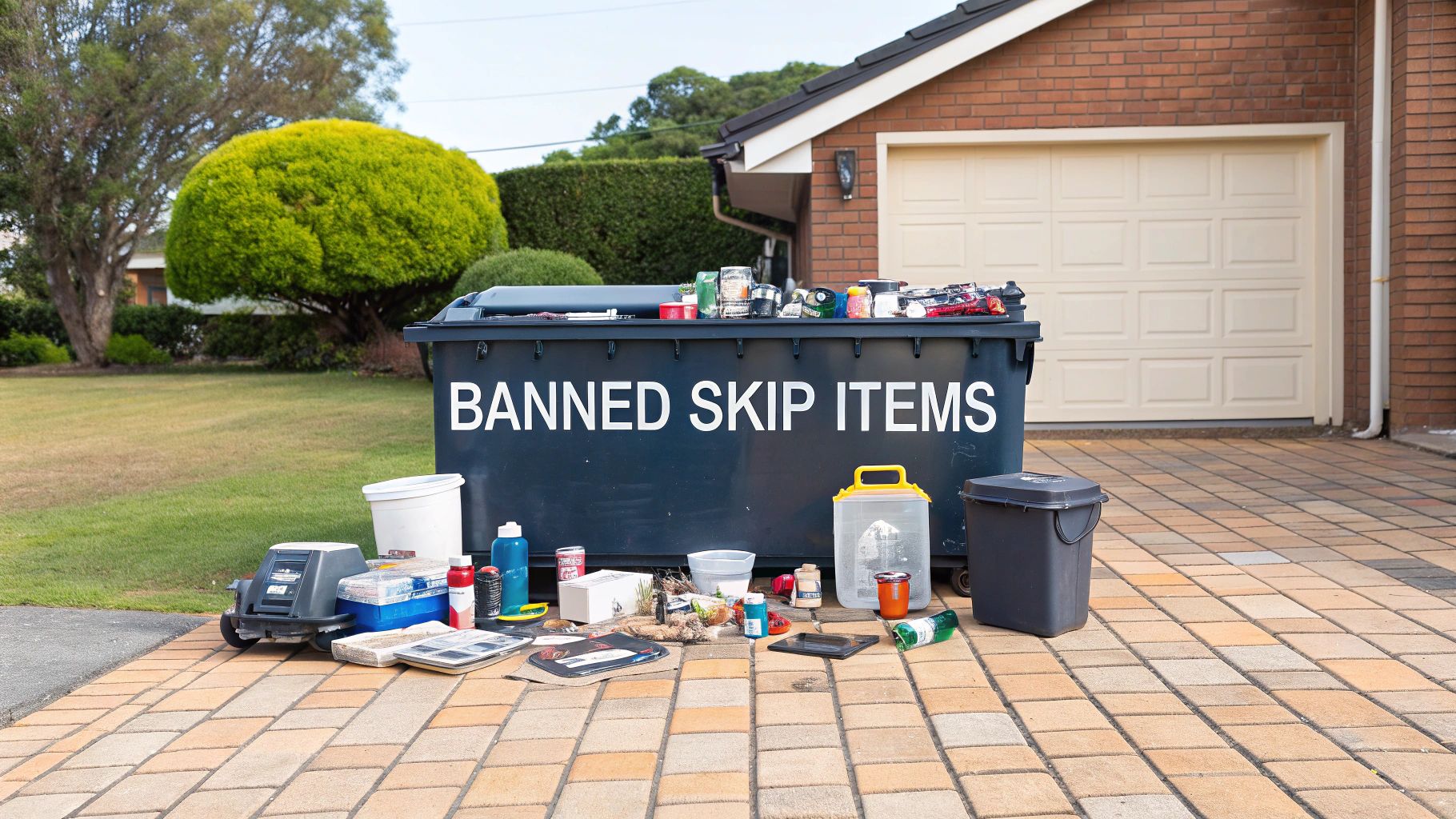
What Can’t You Put in a Skip? 8 Banned Items for 2025
Hiring a skip is a brilliant way to manage waste from a home renovation, garden clear-out, or construction project. It simplifies the process, saving you countless trips to the tip. However, not everything can be thrown into a skip. For safety, environmental, and legal reasons, certain materials are strictly prohibited. Understanding these restrictions is crucial for ensuring a smooth, compliant, and responsible waste disposal process. Misplacing banned items can lead to refused collections, extra charges, and even legal penalties.
Proper waste management should be a key part of any project’s planning phase. For a comprehensive approach to any home project, consult an ultimate home renovation checklist which should always include planning for waste disposal. This ensures you account for every detail, including how to handle restricted materials from the start.
This definitive guide will walk you through exactly what can’t you put in a skip, covering the 8 key categories of prohibited items. We’ll explain the ‘why’ behind each restriction, covering the risks involved and the specific regulations in place. More importantly, we’ll provide practical, actionable advice on how to dispose of these items correctly, helping you protect both the environment and your wallet. Let’s get your waste management sorted the right way.
1. Hazardous and Chemical Waste
Topping our list of things you can’t put in a skip is hazardous and chemical waste. This category includes any substance or material that poses a significant risk to human health or the environment. Skip hire companies are legally prohibited from handling these items because they require specialised disposal to prevent contamination of soil, water, and air.
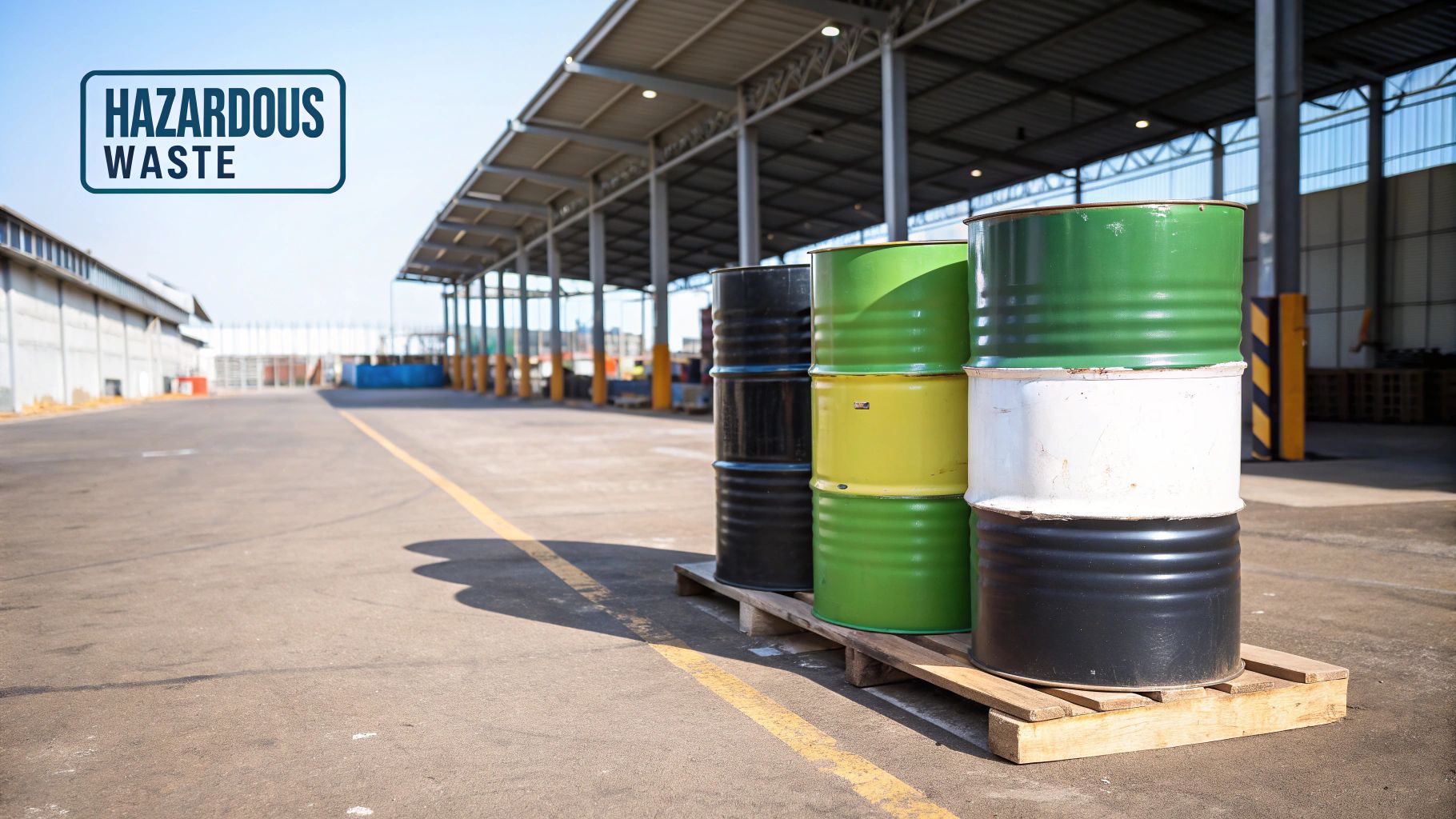
Improper disposal of hazardous materials can lead to severe environmental damage and hefty fines for both the individual and the waste carrier. Understanding these restrictions is crucial for a safe and compliant waste management process. For an in-depth look at the rules, you can explore the UK’s hazardous waste disposal regulations.
What Qualifies as Hazardous Waste?
Many common household and commercial items fall into this category. It’s essential to check labels for warning symbols like “toxic,” “corrosive,” or “flammable” before attempting to dispose of them.
- Paints and Solvents: Leftover paint tins, turpentine, thinners, and wood stains.
- Automotive Products: Used motor oil, antifreeze, and lead-acid car batteries.
- Garden and Pest Control: Pesticides, herbicides, and some strong fertilisers.
- Cleaning Agents: Bleach, oven cleaners, drain unblockers, and other corrosive chemicals.
- Medical Waste: Syringes, expired pharmaceuticals, and any biologically contaminated materials.
Safe and Legal Disposal Alternatives
If you can’t put hazardous waste in a skip, what should you do? Fortunately, there are dedicated channels for safe disposal.
Key Takeaway: Your local council is the best resource for hazardous waste disposal. Most operate Household Waste Recycling Centres (HWRCs) with designated drop-off points for these materials.
Always check your council’s website for specific instructions, as some may offer special collection days or require you to book a slot. Never pour chemicals down the drain or mix different substances, as this can create dangerous chemical reactions. Using up a product completely is often the easiest and most environmentally friendly disposal method.
2. Electrical Items and WEEE Waste
Another major category of items you can’t put in a skip is Waste Electrical and Electronic Equipment, commonly known as WEEE. This classification covers anything with a plug, a battery, or a charging cable. These items are prohibited because they contain both valuable components that can be recycled and hazardous materials, such as mercury, lead, and flame retardants, which can harm the environment if sent to landfill.
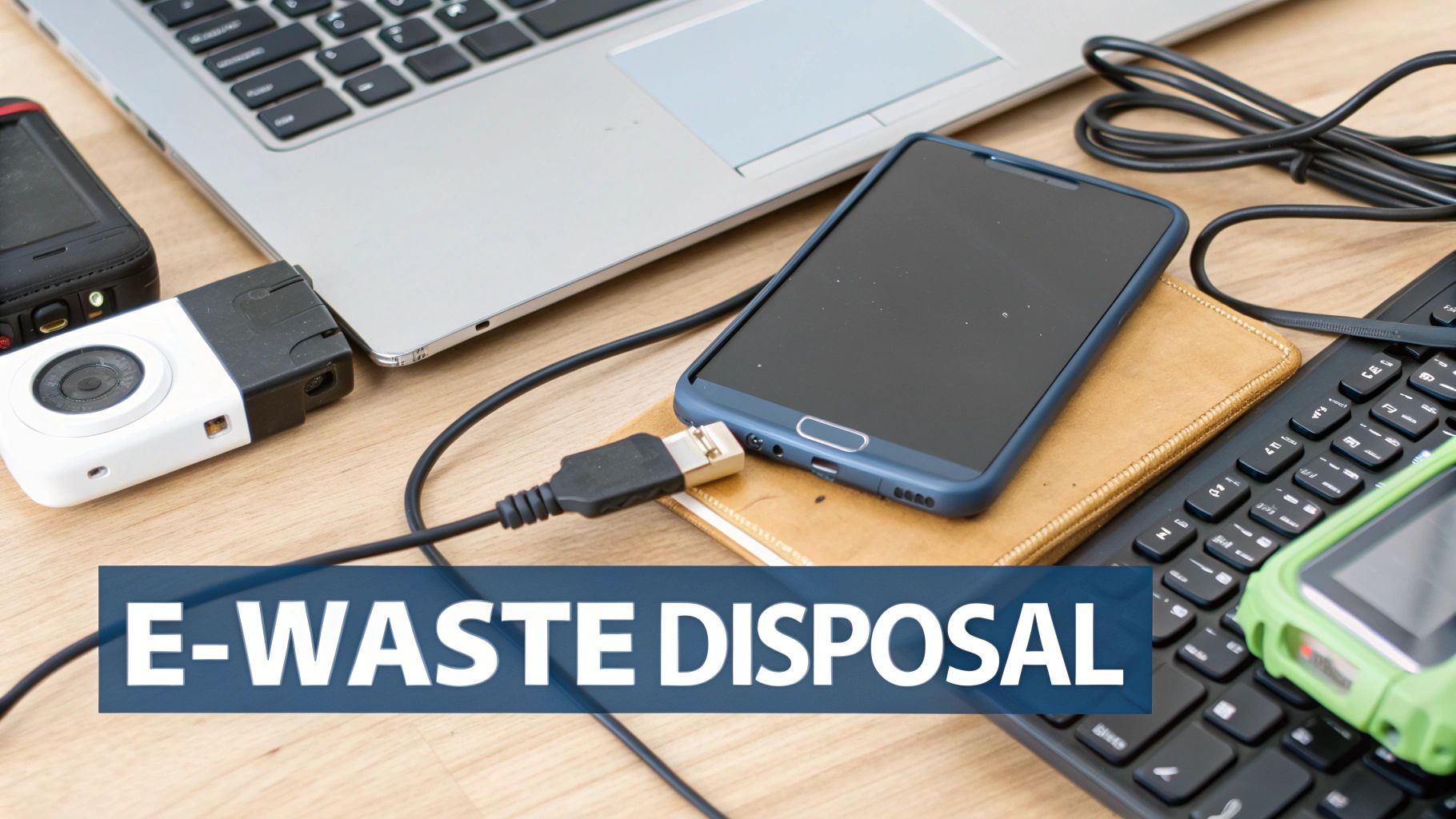
Under UK regulations, skip hire companies are not permitted to accept WEEE waste alongside general waste. These items must be collected and processed separately at specialised recycling facilities to safely recover materials and manage dangerous substances. For a deeper understanding of this process, you can find more information about e-waste recycling best practices.
What Qualifies as WEEE Waste?
The WEEE category is incredibly broad, covering everything from large household appliances to small personal gadgets. If it has a circuit board or electrical components, it’s considered WEEE.
- Large Appliances: Refrigerators, freezers, washing machines, and cookers.
- IT and Telecoms Equipment: Computers, laptops, monitors, printers, and mobile phones.
- Consumer Electronics: Televisions, stereos, DVD players, and digital cameras.
- Small Household Appliances: Kettles, toasters, vacuum cleaners, and microwaves.
- Lighting Equipment: Fluorescent tubes and energy-saving light bulbs.
Safe and Legal Disposal Alternatives
Disposing of old electronics responsibly is crucial and relatively straightforward. There are several dedicated routes for ensuring your WEEE waste is handled correctly, preventing environmental contamination and promoting a circular economy.
Key Takeaway: Many local councils offer a dedicated kerbside collection service for small electrical items, or have specific WEEE disposal points at their Household Waste Recycling Centres (HWRCs).
For larger appliances, retailers often provide a take-back service when delivering a new item. Before disposing of any device containing personal information, such as a computer or mobile phone, ensure you securely wipe all data to protect your privacy. Always check your local council’s website for their specific WEEE disposal guidelines.
3. Asbestos-Containing Materials
Without a doubt, one of the most dangerous materials you can’t put in a skip is anything containing asbestos. This hazardous substance was widely used in UK construction materials until its ban in 1999 due to its link to serious health conditions. Skip hire companies are strictly forbidden from accepting asbestos, as it requires highly specialised, licensed handling and disposal to prevent its carcinogenic fibres from becoming airborne.
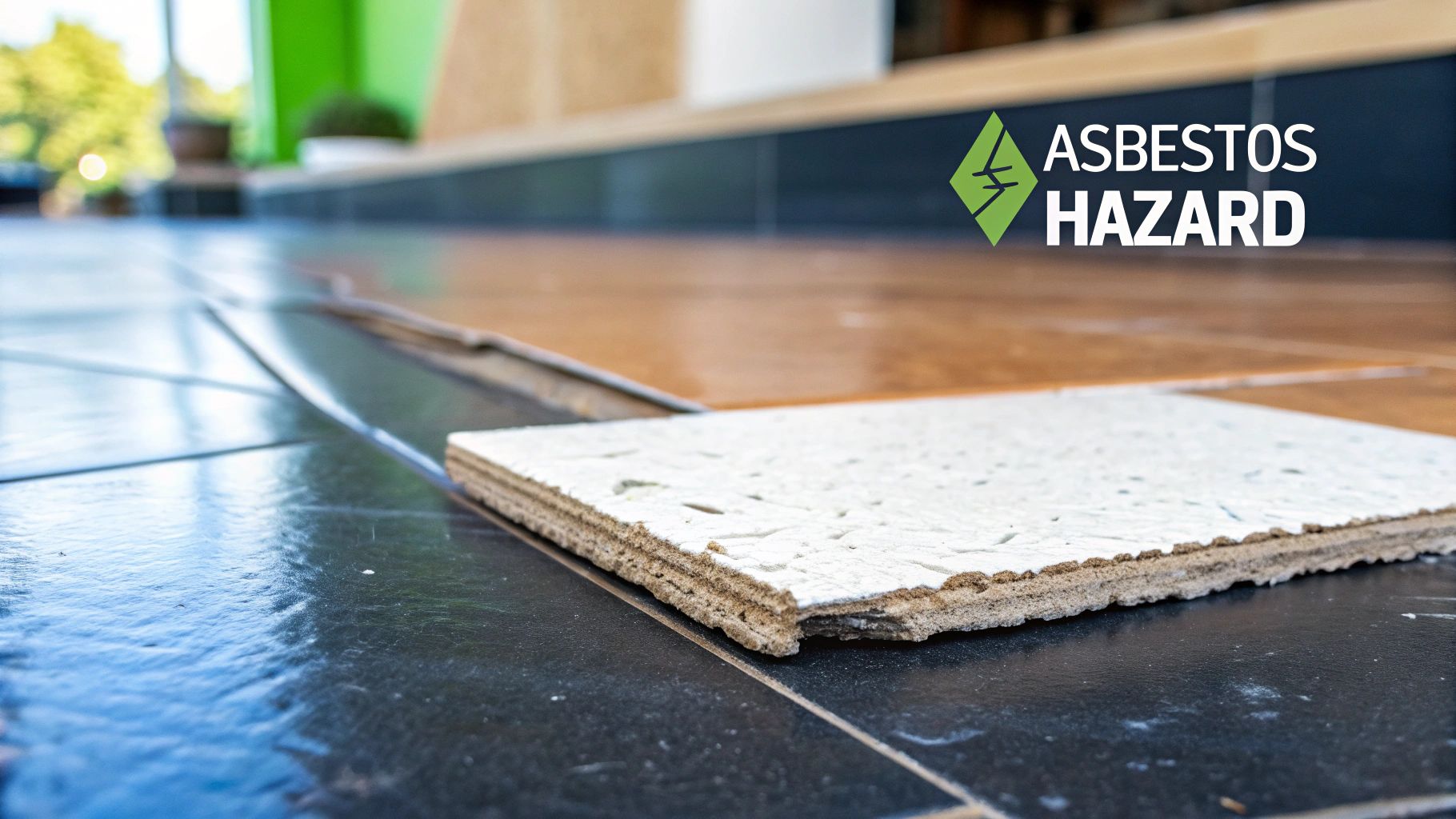
Attempting to dispose of asbestos incorrectly is not only illegal but also incredibly dangerous. Understanding the dangers is key to proper handling; you can learn more about the risks associated with asbestos exposure. Fines for non-compliance are substantial, reflecting the severe threat it poses to public health and the environment.
What Qualifies as Asbestos-Containing Material?
Asbestos can be found in many materials within buildings constructed or refurbished before the year 2000. It is often difficult to identify by sight alone, requiring professional testing.
- Roofing and Siding: Corrugated cement roof sheets, soffits, and some roof tiles.
- Insulation: Lagging around pipes and boilers, and loose-fill insulation.
- Decorative Coatings: Artex and other textured ceiling or wall coatings.
- Flooring: Certain types of vinyl floor tiles and the adhesive used to stick them down.
- Outbuildings: Garage and shed roofing panels are common sources.
Safe and Legal Disposal Alternatives
Disposing of asbestos is a task that must be left to the professionals. There is no safe DIY method for its removal or disposal.
Key Takeaway: You must use a Health and Safety Executive (HSE) licensed contractor for the removal and disposal of most asbestos-containing materials. They will ensure it is handled safely and taken to a licensed disposal facility.
Never break, drill, or disturb materials you suspect contain asbestos. If you are planning a renovation, it is wise to get an asbestos survey done first. For guidance on finding a qualified service, you can find more information about compliant asbestos disposal services near you.
4. Tires and Rubber Products
Another common item you can’t put in a skip is vehicle tires and other large rubber products. Due to their resilient and non-biodegradable nature, tires pose significant challenges for landfills. Skip hire companies are not licensed to handle them as they require specialised recycling processes.
Improperly disposed of tires take up immense space, can trap harmful methane gas in landfills creating a fire hazard, and may become breeding grounds for pests like mosquitoes. Adhering to the proper disposal rules is vital for environmental safety and to avoid potential fines for illegal dumping.
What Qualifies as Banned Rubber?
This restriction primarily targets whole vehicle tires but can also include other bulky rubber items that are difficult to process through standard waste streams.
- Vehicle Tires: Car, truck, van, and motorcycle tires are the most common culprits.
- Heavy Machinery Tires: Larger tires from agricultural or construction vehicles.
- Bicycle Tires: While smaller, many services still restrict them.
- Large Rubber Matting: Industrial or commercial rubber flooring and mats.
Safe and Legal Disposal Alternatives
Disposing of old tires is straightforward if you know the correct channels. Most options are low-cost or even free and ensure the materials are repurposed responsibly.
Key Takeaway: Many tire retailers are legally obliged to take back old tires when you purchase new ones, often incorporating the disposal fee into the price. This is typically the easiest disposal method.
Your local council’s Household Waste Recycling Centre (HWRC) will usually accept a limited number of car tires from residents, but it’s crucial to check their specific policy online beforehand as charges may apply. For commercial quantities, you must use a certified waste carrier that specialises in tire recycling.
5. Medical and Clinical Waste
Medical and clinical waste is a highly regulated category that must never be placed in a standard skip. This type of waste includes any material that is generated from healthcare activities and could pose a risk of infection or injury. Due to the potential for transmitting diseases and causing physical harm, it requires specialised handling and disposal procedures, such as incineration at licensed facilities.
Skip hire companies are not equipped or legally permitted to manage this biohazardous material. Disposing of it incorrectly not only violates waste regulations but also presents a serious public health hazard. Understanding how to manage these items is vital for anyone undergoing medical care at home or for businesses in the health and wellness sector.
What Qualifies as Medical Waste?
This category covers a broader range of items than many people realise. It extends beyond professional healthcare settings and includes materials generated from home-based medical treatments. It is crucial to segregate these items from your general and skip waste.
- Sharps: Used syringes, needles, lancets, and other sharp medical instruments.
- Pharmaceuticals: Unused or expired prescription and over-the-counter medications, including pills, liquids, and inhalers.
- Contaminated Materials: Bandages, dressings, swabs, and disposable gloves that have been in contact with blood or other bodily fluids.
- Medical Devices: Used testing strips, IV bags, catheters, and other disposable medical equipment.
- Biologicals: Unused vaccines or other biological products.
Safe and Legal Disposal Alternatives
Disposing of medical and clinical waste requires using designated, safe channels to protect sanitation workers and the public. Fortunately, there are clear, established procedures for handling these materials correctly and safely.
Key Takeaway: Your local GP surgery, pharmacy, or council can provide specific guidance and the necessary containers for safe disposal. Never discard these items in your household bins or a skip.
Most councils operate a clinical waste collection service for households that produce this type of waste. You can usually arrange for a special collection of sharps bins and other sealed bags. For unused medications, the best practice is to return them to any local pharmacy, as they have procedures for safe and secure disposal.
6. Gas Bottles and Pressurized Containers
Another critical category of items you can’t put in a skip is gas bottles and other pressurized containers. These items present a significant safety hazard because they can explode if punctured, crushed, or exposed to heat during the waste handling and compaction process. Skip hire companies and recycling facilities strictly prohibit them to prevent serious injury to staff and damage to machinery.
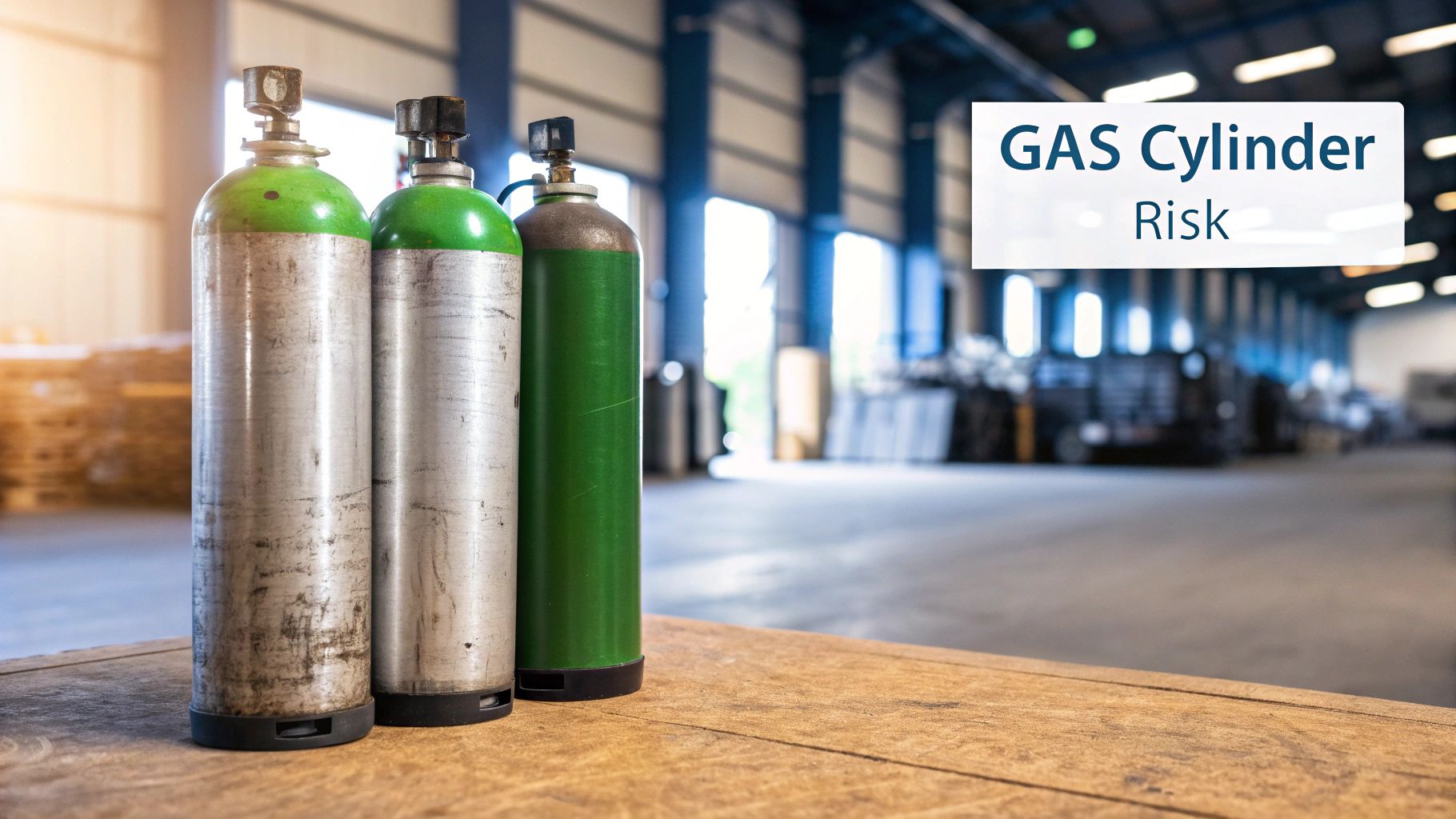
The contents of these containers, whether flammable gas or inert compressed air, can cause violent and dangerous ruptures. The potential for an explosion makes them completely unsuitable for general waste collection, requiring careful and specialised handling to ensure they are decommissioned safely before being recycled.
What Qualifies as a Pressurized Container?
This category includes a wide range of containers that hold contents under pressure. You can often identify them by their robust metal construction and a valve or nozzle for releasing the contents.
- Gas Cylinders: Propane and butane bottles for BBQs and patio heaters.
- Welding Tanks: Oxygen and acetylene tanks used in metalwork.
- Fire Extinguishers: All types of fire extinguishers, including water, foam, CO2, and powder.
- Aerosol Cans: Deodorant, hairspray, spray paint, and air freshener cans that are not completely empty.
- Diving Tanks: Compressed air tanks used for scuba diving.
Safe and Legal Disposal Alternatives
Disposing of pressurized containers is straightforward if you follow the correct procedures. The primary rule is to never place them in a skip or your household bins.
Key Takeaway: The original supplier is often the best point of contact for disposal. Most gas cylinder suppliers operate a return scheme, allowing you to take back empty bottles for refilling or recycling.
For other items like fire extinguishers, contact a specialist fire safety company. Many local Household Waste Recycling Centres (HWRCs) also have designated areas for gas bottles and some types of aerosol cans, but it is vital to check your local council’s specific rules beforehand. Always ensure aerosols are completely empty before recycling them with other metal packaging.
7. Liquids and Wet Waste
A general rule of thumb for skip hire is to keep things dry. Liquids and wet waste are strictly prohibited because they pose significant risks during transport and processing. Spills can leak from the skip onto roads, creating a public hazard, and can contaminate other recyclable materials within the skip, rendering them useless.
At waste management facilities, wet waste can damage sorting machinery and complicate the entire recycling process. This is why skip hire companies enforce a “no liquids” policy to ensure safety, compliance, and environmental responsibility. Understanding what constitutes wet waste is a key part of figuring out what can’t you put in a skip.
What Qualifies as Liquids and Wet Waste?
This category is broad and covers more than just obvious liquids. It includes any material that is saturated or could release liquid under compression.
- Paints and Wood Stains: Tins of wet paint, varnishes, and wood stains.
- Oils and Automotive Fluids: Used motor oil, hydraulic fluids, and antifreeze.
- Cleaning Products: Unused liquid bleach, detergents, and other chemical cleaners.
- Wet Concrete and Cement: Slurry or unset concrete and cement mixtures.
- Food and Cooking Liquids: Large quantities of cooking oils, fats, and other food-related liquids.
Safe and Legal Disposal Alternatives
Disposing of liquids and wet waste correctly is crucial to avoid environmental harm and potential fines. Fortunately, several simple and effective alternatives are available.
Key Takeaway: The best approach is to solidify, use up, or take liquids to a designated collection point. Never pour oils or chemicals down the drain or onto the ground.
For items like paint, you can leave the lid off the tin in a well-ventilated area to let it dry out completely; once solid, the tin can often be disposed of in general waste or taken to a recycling centre. Absorbent materials like cat litter or sawdust can also be added to paint tins to speed up the drying process. Local household waste recycling centres have specific collection tanks for things like engine oil, and many garages will accept it for recycling.
8. Hot Ash, Coals, and Fire Materials
A less obvious but critically important item you can’t put in a skip is any material that is still hot or could reignite. This includes ash from fireplaces, used barbecue coals, and the remnants of bonfires. These materials pose a significant fire hazard, as they can smoulder for days and easily ignite other combustible waste in the skip, such as paper, wood, or plastics.

Placing hot materials in a skip not only endangers the skip and its contents but also presents a serious risk to the collection vehicle and the waste processing facility. Skip hire companies strictly prohibit these items to prevent costly damage and ensure the safety of their staff and the public.
What Qualifies as Hot Fire Materials?
Even if ash or coals look grey and extinguished on the surface, they can retain intense heat at their core for a surprisingly long time. It is vital to treat all recently burned materials with caution.
- Fireplace and Wood Stove Ash: Ash from solid fuel fires needs to be completely cold before disposal.
- Barbecue Charcoal and Briquettes: Used coals from a barbecue can stay hot for over 24 hours.
- Fire Pit and Bonfire Remains: Embers from larger outdoor fires are a major risk and require extensive cooling.
- Cigarette Butts: Although small, a lit cigarette can easily start a fire in a skip full of dry waste.
- Incense and Candle Remains: Hot wax and embers from incense sticks must be fully extinguished.
Safe and Legal Disposal Alternatives
Ensuring fire materials are safe for disposal simply requires patience and proper handling. The primary goal is to guarantee they are completely cold before they come into contact with any other waste.
Key Takeaway: Always allow fire materials to cool for a minimum of 72 hours in a fireproof container before disposal. A galvanised metal bin with a secure lid is the ideal choice for this.
Before disposing of the cold ash, you can sprinkle it with water as a final precaution to eliminate any lingering heat. Once completely cold, small amounts of wood ash can often be composted or used to enrich garden soil, but check local guidelines first. Otherwise, it can be bagged and placed in your general household waste bin.
8 Items You Can’t Put in a Skip Comparison
| Waste Type | Implementation Complexity 🔄 | Resource Requirements ⚡ | Expected Outcomes 📊 | Ideal Use Cases 💡 | Key Advantages ⭐ |
|---|---|---|---|---|---|
| Hazardous and Chemical Waste | High – Specialized handling and strict compliance | High – Specialized disposal facilities needed | Prevents soil/water contamination and health risks | Industrial, household chemicals, pest control | Minimizes environmental/health hazards |
| Electrical Items and WEEE Waste | Moderate to High – Complex disassembly and data wiping | Moderate – Specialized recycling and data security | Recovers valuable materials, prevents toxins in landfill | Consumer electronics, appliances recycling | High recycling value, reduces virgin material use |
| Asbestos-Containing Materials | Very High – Licensed removal by professionals | Very High – Certified contractors and disposal | Avoids carcinogenic exposure, legal compliance | Renovations of pre-1980s buildings | Essential health protection, legal compliance |
| Tires and Rubber Products | Moderate – Collection and specialized processing | Moderate – Recycling facilities for rubber/steel | Reduces landfill space, prevents fire and pests | Vehicle service centers, waste rubber disposal | Recyclable into useful products (roads/playgrounds) |
| Medical and Clinical Waste | Very High – Specialized incineration and chain of custody | Very High – Licensed treatment and documentation | Prevents infection spread, complies with health laws | Healthcare facilities, pharmacies | Controls infection risks, secure pharmaceutical disposal |
| Gas Bottles and Pressurized Containers | High – Careful handling and explosion risk management | High – Specialized recycling and safety equipment | Prevents explosions, environmental release | Industrial gas use, welding, aerosols disposal | Minimizes explosion and injury hazards |
| Liquids and Wet Waste | Moderate to High – Leak prevention and containment | Moderate – Absorbents and specialized recycling | Prevents contamination, reduces equipment damage | Paint shops, garages, food waste | Reduces pollution, protects machinery |
| Hot Ash, Coals, and Fire Materials | Moderate – Cooling and safe storage required | Low to Moderate – Metal containers and time | Prevents fires and property damage | Residential fireplaces, BBQ waste disposal | Prevents fire hazards during waste collection |
Your Next Steps for Safe and Compliant Waste Removal
Navigating the world of waste removal can seem complex, but understanding the regulations is the cornerstone of a successful project. By now, you’ve learned that a skip is not a one-size-fits-all solution for every type of debris. The core principle is simple: hazardous, volatile, and environmentally damaging materials require specialised handling and must be kept separate from general waste. Mastering the list of what can’t you put in a skip is not just about avoiding fines; it’s a fundamental part of responsible project management and environmental stewardship.
Key Takeaways for Compliant Disposal
The restrictions we’ve explored, from asbestos and chemical waste to electrical items (WEEE) and pressurised gas bottles, are in place for crucial reasons. These rules protect waste management workers from harm, prevent toxic substances from contaminating soil and water systems, and ensure valuable or dangerous materials are recycled or neutralised correctly. The single most important takeaway is to think before you throw. Always pause to consider an item’s composition. Is it a liquid? Does it contain batteries or a plug? Could it be flammable or toxic? This simple habit can prevent costly and dangerous mistakes.
For instance, while a few bricks and some old timber are perfect for a skip, a single tin of leftover paint or an old car battery can turn a compliant load into a hazardous one. Similarly, large, complex items made of mixed materials fall into their own unique categories. An entire vehicle, for example, is unequivocally banned from skips and requires a dedicated scrap car disposal service to be dismantled and recycled according to strict environmental regulations.
Your Actionable Checklist for Success
To ensure your next project runs smoothly, adopt this straightforward, proactive approach:
- Segregate at the Source: Before you even hire a skip, sort your waste into distinct categories: general waste, recyclables, and prohibited items. This makes the entire process more efficient and significantly reduces the risk of cross-contamination.
- Consult Your Council: Your local council’s website is an invaluable resource. It will provide detailed information on local household waste recycling centres (HWRCs), hazardous waste collection services, and specific guidelines for disposing of items like tyres, batteries, and paint.
- Question Your Skip Provider: When booking, be transparent about the waste you have. A reputable company will ask you what you plan to dispose of and can advise on any potential issues. If you’re unsure about an item, always ask them directly before placing it in the skip.
By embracing these practices, you transform waste disposal from a potential liability into a structured, compliant, and safe part of your operation. You contribute to a circular economy, protect community health, and build a reputation for professionalism and responsibility. Your commitment to proper disposal doesn’t just clear out clutter; it actively builds a cleaner, safer environment for everyone.
Ready to handle your waste the right way? At The Waste Group, we make compliant disposal straightforward and stress-free. Whether you need a standard skip for a home clear-out or specialised advice on difficult waste streams, our expert team is here to help you navigate the rules. Book your skip online or contact us today to ensure your project is safe, legal, and environmentally responsible.
